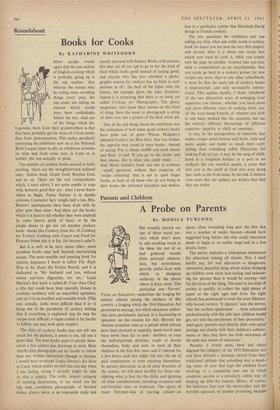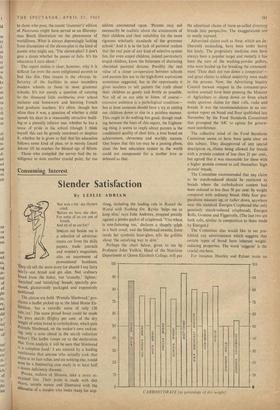Parents and Children
A Probe on Parents
By MONICA FURLONG
PEP recently carried out one of those social sur- veys which don't seem to add anything much to the ideas the rest of us had gathered merely from personal observa- tion, but nevertheless provide useful facts with which to bludgeon authority in the places where it hurts most. This particular one—Parents' Views on Education—underlines the longing for nursery schools among the mothers of this country, a longing which the 1944 Education Act promised to assuage, but which education author- ities have persistently starved. It is fascinating to speculate on the reasons for this. Beyond the obvious economic ones at a period when schools have been strained to capacity, quasi-moral ones have never been far to seek : mothers, so runs the half-expressed doctrine, ought to devote themselves, body and soul, to each of their children in the first five years and if relieved for a few hours each day might fall into the sin of paid employment or even enjoying themselves. In nursery education, as in all other branches of the system, we still seem terribly far from con- sidering what is best for the child, and ignoring all other considerations, including economic and anti-feminist ones, as irrelevant. The agony of many five-year-olds at starting school—an agony often extending long past the first day into a number of weeks beyond—should have suggested long before this that social education needs to begin at an earlier stage and in a less drastic form.
The survey indicates a widespread enthusiasm for education among all classes. Not, I need hardly say, for real education—a dangerous, subversive, beautiful thing which makes bringing up children even more hair-raising and exhaust- ing for parents than it would be anyway—but for, the form of the thing. The need in our kind of society to qualify, to collect the right pieces of paper at the right ages and from the right schools has penetrated to even the most illiterate, telly-bound corners. 'It appears,' says the survey, 'that the mothers questioned . . . were concerned predominantly with the jobs their children would get, not with the enrichment of their personality.' And again 'parents may identify their own social prestige too closely with their children's achieve- ments or they may have too little awareness of the ends and means of education.'
Parents, it would seem, have just about digested the indignity of the 1870 Education Act and have effected a dramatic switch from their traditional attitude that schooling was a, shock- ing waste of time that kept the children from working, to a completely new one in which academic success is a peculiarly subtle way of keeping up with the Joneses. Hence, of course, the ludicrous fuss over the eleven-plus, and the horrible spectacle of parents promising bicycles to those who pass; the recent 'crammer's' edition of Panorama might have served as an Hierony- mus Bosch illustration on the phenomena of worldliness. What is always depressingly lacking from discussions of the eleven:plus is the kind of parent who might say, 'The eleven-plus? I don't give a damn whether he passes or fails. It's his education I. care about.'
The report makes it clear, however, why it is difficult for even the most enlightened parents to feel like this. One reason is the obvious in- feriority of the facilities in most secondary modern schools to those in most grammar schools. It's not merely a question of catering to the thousand little snobberies over school uniform and homework and learning French and graduate teachers. It's often, though less often than it was, a question of whether a child spends his days in a reasonably attractive build- ing or a patently inferior one, whether he has a sense of pride in his school (though I think myself this can be grossly overdone) or despises it, whether he is given to feel that his education follows some kind of plan, or is merely forced labour till he reaches the blessed age of fifteen.
Those who compiled the survey had the in- telligence to note another crucial point, far too seldom commented upon. 'Parents may not necessarily be realistic about the attainments of their children and their suitability for the more rigorous scholastic standards of the grammar school.' And it is in the lack of parental realism that the real pain of any kind of selective system lies, for even stupid children, indeed particularly stupid children, know the bitterness of shattering cherished parental dreams. Possibly the real value of a closer co-operation between schools and parents lies not in the high-flown aspirations sometimes suggested, but in the opportunity it gives teachers to tell parents the truth about their children as gently and firmly as possible. Not all of us are able to listen, of course— excessive ambition is a pathological condition— but at least someone should have a try at cutting our children down to size in a painless manner. This ought to do nothing but good, though read- ing between the lines of this report, the frighten- ing thing it seems to imply about parents is the conditional quality of their love, a love based on achievement, cleverness and worldly success. One hopes that this too may be a passing phase, since the best education system in the world could not compensate for a mother love as debased as that.















































 Previous page
Previous page